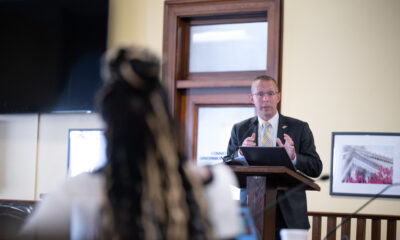Mississippi Today
Legislative recap: 2025 tax cut battle has been joined

After relatively brief debate and questioning given its magnitude, the state House passed the first meaningful legislation of the new session: House Bill 1, a measure that would eliminate the state income tax, trim taxes on non-prepared food and raise sales and gasoline taxes.
It would mark a sea change in state tax structure, a shift from income to consumption taxation.
“We are at a place where we can finally tell the hard-working people of Mississippi we can eliminate the tax on work,” House Ways and Means Chairman Trey Lamar, HB1’s author, told his colleagues.
The measure passed the House 88-24. It gained some Democratic support in the supermajority Republican House, with nine Democrats voting in favor, 24 against and 12 voting present.
The proposal garnered some bipartisan support because it includes at least a couple of items Democratic lawmakers have championed in the past: A gasoline tax to help fix crumbling roadways, and a reduction in the “grocery” tax, or the sales tax levied on unprepared food, of which Mississippi has the highest overall rate in the nation.
It still met with some Democratic opposition in part because it is a sea change toward more “regressive” taxation. Proponents say this is just, people should pay more for state services they use, such as roadways, and for things they buy as opposed to taxing income. Opponents say this places a proportionately higher tax burden on people of modest means.
“I would say the people hurt the most with this would be working people who have to put gas in their car to go to work or those who have to purchase materials to do a job,” House Democratic Leader Robert Johnson said.
Beyond that concern, opponents or skeptics worry that the foundation of the proposed tax overhaul would be built on shifting sands — a state economy that has been so rosy primarily from the federal government dumping billions of dollars in pandemic spending into Mississippi. With the federal spigot being cut off, some worry, the state economy could slump, and the massive tax cuts in this new plan could provide a state budget crisis, of which Mississippi has much experience, and underfunding of crucial services such as schools, roads, health care and law enforcement.
The largest hurdle Republican House leaders face in seeing their tax plan through to law is not in garnering bipartisan support. It’s internecine disagreement with the Senate Republican leadership, which still appears to harbor abovementioned concerns about overhauling tax structure in uncertain economic times and betting on growth to cover massive tax cuts.
Senate leaders have said they want to enact more tax cuts, but their plan has not yet been released. Lt. Gov. Delbert Hosemann has provided some details of what he wants to see, but it would appear he wants a more cautious approach on cuts. He has not publicly opined on the tax increases in the House plan.
Quote of the Week
“Have you ever worn a belt and suspenders, lady? It’s a belt and suspenders approach.” — Rep. Trey Lamar, R-Senatobia, to Rep. Omeria Scott, D-Laurel, during floor debate on Lamar’s bill to eliminate the state income tax and raise other taxes.
“No. I have not worn a belt and suspenders. I don’t know anyone who has worn a belt and suspenders,” Scott replied.
In Brief
House will renew push to legalize mobile sports betting
House Gaming Committee Chairman Casey Eure, R-Saucier, told Mississippi Today he plans on taking another crack at legalizing mobile sports betting in the state. In 2024, the House and Senate passed versions of legislation to permit online sports betting, but never agreed on a final proposal. Some lawmakers raised concerns that gambling platforms would have no incentive to partner with smaller casinos, and most of the money would instead flow to the Mississippi Gulf Coast’s already bustling casinos. Proponents say legalization would undercut the influence of illicit offshore sports betting platforms.
“I’ve been working on this bill for many years and I’m just trying to satisfy any concerns that the Senate may have so we can pass this and start collecting the tax dollars that the state deserves and not allowing everyone to place bets with these offshore accounts,” Eure said. “I feel like the state is losing between $40-$80 million a year in tax revenue.”
Sports wagering has been permitted in the state for years, but online betting has remained illegal amid fears the move could harm the bottom line of the state’s brick-and-mortar casinos. Mobile sports betting is legal in 30 states and Washington, D.C., according to the American Gaming Association. — Michael Goldberg
Hosemann makes Senate committee chair changes
Republican Lt. Gov. Delbert Hosemann last week named new chairmen of committees, after former state Sen. Jenifer Branning was sworn into office as a new justice on the Mississippi Supreme Court.
Sen. Chuck Younger, a Republican from Columbus, previously led the Senate Agriculture Committee and will replace Branning as chairman of the Transportation Committee. Sen. Neil Whaley, a Republican from Potts Camp, previously led the Senate Wildlife, Fisheries and Parks Committee, but will now lead the Senate Agriculture Committee.
Here are the other changes to Senate committees:
Sen. Ben Suber, a Republican from Bruce, will be the new chairman of the Senate Wildlife, Fisheries and Parks Committee
Sen. Bart Williams, a Republican from Starkville, is the new chairman of the Senate Public Property Committee
Sen. Scott DeLano, a Republican from Gulfport, will lead the Senate Technology Committee
Sen. Robin Robinson, a Republican from Laurel, will chair the Senate Labor Committee
Sen. Angela Turner Ford, a Democrat from West Point, will lead the Senate Drug Policy Committee. — Taylor Vance
What’s in a name? Democratic Rep. Scott hopes GOP majority will pass ‘Donald J. Trump Act’ bills
Perhaps tired of seeing many measures she authors ignored or shot down in flames by the Republican supermajority in the Mississippi Legislature, Democratic Rep. Omeria Scott of Laurel is trying a new strategy: naming bills after Republican President-elect Trump.
For this session, Scott has authored: House Bill 61, the “Donald J. Trump Voting Rights Restoration Act;” House Bill 62, the “Donald J. Trump Ban-The-Box Act … to prohibit public employers from using criminal history as a bar to employment;” and House Bill 249, the “Donald J. Trump Early Voting Act.” — Geoff Pender
More bills filed to criminalize abortion
Since the 2022 Dobbs Supreme Court decision overturned the constitutional right to an abortion, Mississippi lawmakers have proposed bills to criminalize workarounds to the state’s strict abortion ban – including criminalizing the abortion pill and out-of-state abortions. The 2025 legislative session is no exception.
Rep. William Tracy Arnold, R-Booneville, filed House Bill 616 that would make it a felony to manufacture or make accessible medication abortion. Anyone convicted of the crime would be subject to a fine between $1,000 and $5,000, as well as imprisonment between two and five years. Last year, about 250 Mississippians each month requested medication abortion from Aid Access, the only online telemedicine service supplying medication abortion via mail in the U.S.
Helping a minor receive an abortion would also be criminalized under House Bill 148 filed by Rep. Mark Tullos, R-Raleigh. That would include transporting a minor out of state to undergo an abortion, as well as helping a minor procure a medication abortion – both of which would be punishable by not less than 20 years in prison or a fine of not less than $50,000. — Sophia Paffenroth
By the Numbers
$1.1 billion
The estimated net annual cost of the House plan to eliminate the state income tax and raise sales taxes, once fully phased in. Proponents say economic growth would allow the state budget, currently about $7 billion a year, to absorb the cut. Eliminating the income tax would cost the state $2.2 billion in revenue, but the House plan would raise about $1.1 billion in other taxes in offset.
0
The amount of income tax Mississippians would pay after a 10-year phased in elimination of the state income tax. With previous cuts being phased in, state income taxes next year will already be reduced to 4%, among the lowest rates in the nation.
8.5 %
The new Mississippi sales tax, up from current 7%, under the House tax plan assuming most local governments would not opt out of adding a new 1.5% local sales tax.
13 cents more a gallon
The cost of the House’s proposed new 5% gasoline tax, based on last week’s average cost of gasoline in Mississippi of $2.62. The new 5% tax would be on top of the flat 18.4 cents a gallon current state excise on gasoline.
4%
The tax on unprepared food once a reduction of the current 7% would be phased in over a decade under the House plan. The state would over time reduce its sales tax on such groceries to 2.5%, but local governments would add a 1.5% sales tax to such items unless they opt out.
Full Legislative Coverage
Lawmakers must pass new legislation to improve access to prenatal care
Lawmakers will file another bill this session to help low-income pregnant women get into the doctor earlier – after the federal government rejected the program set up under last year’s law, because of discrepancies between what was written into state law and federal regulations for presumptive Medicaid eligibility. Read the story.
Proposal: eliminate income tax, add 5% tax on gas, allow cities, counties to levy local sales tax
House leaders last week unveiled a sweeping tax cut proposal that would eventually abolish the state income tax, slash taxes on groceries, increase local sales taxes and shore up funds for state and local road work. Read the story.
A new Mississippi law aims to limit jailing people awaiting mental health treatment. Is it working?
Officials say a new law to decrease the number of people being jailed solely because they need mental health treatment has led to fewer people with serious mental illness detained in jails – but the data is contradictory and incomplete. Lawmakers plan legislation to make more counties report the data. Read the story.
How soon we forget: Mississippi House push for record tax cuts revives fear of repeat budget crises
Eight years ago, from a combination of dozens of tax cuts the Legislature approved and a slumping economy, the state saw a budget crisis that resulted in severely underfunded schools, government layoffs, a near halt to building new roads and highways and problems maintaining the ones we have, too few state troopers on the highways and cuts to most major state services. Read the story.
NAACP legislative redistricting proposal pits two pairs of senators against each other
The Mississippi chapter of the ACLU has submitted a proposal to the courts to redraw the state’s legislative districts that creates two new majority-Black Senate districts and pits two pairs of incumbent senators against one another. Read the story.
Legislation to send more public money to private schools appears stalled as lawmakers consider other changes
Some top lawmakers in Mississippi’s Republican-controlled Legislature are prepared to make it easier for students to transfer between public schools but remain skeptical of sending more public money to private schools. Read the story.
House passes $1.1 billion income tax elimination-gas and sales tax increase plan in bipartisan vote
A bill that phases out the state income tax, cuts the state grocery tax and raises sales taxes and gasoline taxes passed the House of Representatives with a bipartisan vote on Thursday. Read the story.
Tate Reeves and other top Mississippi Republicans owe thanks to President Joe Biden
The tremendous cash surpluses that some state Republicans cite when defending their plan to eliminate the state’s income tax would not exist if not for the billions of dollars in federal funds that have been pumped into the state during Biden’s presidential tenure. Read the story.
Podcast: Mississippi transportation director discusses proposed new gasoline tax
Mississippi Department of Transportation Director Brad White tells Mississippi Today’s Geoff Pender and Taylor Vance he’s staying “in his lane” and out of the politics of a House tax overhaul that would eliminate the income tax and raise sales and gasoline taxes, but that he’s pleased lawmakers are trying to address the long running need for a steady new stream of money to help cover highway maintenance needs. Listen to the podcast.
This article first appeared on Mississippi Today and is republished here under a Creative Commons license.![]()
Mississippi Today
New Stage’s ‘Little Women’ musical opens aptly in Women’s History Month
Ties that bind, not lines that divide, at the heart of “Little Women” are what make Louisa May Alcott’s beloved novel such an enduring classic. More than a century and a half since its 1868 publication, the March sisters’ coming-of-age tale continues to resonate in fresh approaches, say cast and crew in a musical version opening this week at New Stage Theatre in Jackson, Mississippi.
“Little Women, The Broadway Musical” adds songs to Alcott’s story of the four distinct March sisters — traditional, lovely Meg, spirited tomboy and writer Jo, quiet and gentle Beth, and artistic, pampered Amy. They are growing into young women under the watchful eye of mother Marmee as their father serves as an Army chaplain in the Civil War. “Little Women, The Broadway Musical” performances run March 25 through April 6 at New Stage Theatre.
In a serendipitous move, the production coincides with Women’s History Month in March, and has a female director at the helm — Malaika Quarterman, in her New Stage Theatre directing debut. Logistics and scheduling preferences landed the musical in March, to catch school matinees with the American classic.
The novel has inspired myriad adaptations in film, TV, stage and opera, plus literary retellings by other authors. This musical version debuted on Broadway in 2005, with music by Jason Howland, lyrics by Mindi Dickstein and book (script) by Allan Knee.
“The music in this show brings out the heart of the characters in a way that a movie or a straight play, or even the book, can’t do,” said Cameron Vipperman, whose play-within-a-play role helps illustrate the writer Jo’s growth in the story. She read the book at age 10, and now embraces how the musical dramatizes, speeds up and reconstructs the timeline for more interest and engagement.
“What a great way to introduce kids that haven’t read the book,” director Quarterman said, hitting the highlights and sending them to the pages for a deeper dive on characters they fell in love with over the two-and-a-half-hour run time.

Joy, familial warmth, love, courage, loss, grief and resilience are all threads in a story that has captivated generations and continues to find new audiences and fresh acclaim (the 2019 film adaptation by Greta Gerwig earned six Academy Award nominations).
In current contentious times, when diversity, equity and inclusion programs are being ripped out or rolled back, the poignant, women-centered narrative maintains a power to reach deep and unite.
“Stories where females support each other, instead of rip each other apart to get to the finish line — which would be the goal of getting the man or something — are very few and far between sometimes,” Quarterman said. “It’s so special because it was written so long ago, with the writer being such a strong dreamer, and dreaming big for women.
“For us to actualize it, where a female artistic producer chooses this show and believes in a brand new female director and then this person gets to empower these great, local, awesome artists — It’s just really been special to see this story and its impact ripple through generations of dreamers.” For Quarterman, a 14-year drama teacher with Jackson Public Schools active in community theater and professional regional theater, “To be able to tell this story here, for New Stage, is pretty epic for me.”
Alcott’s story is often a touchstone for young girls, and this cast of grown women finds much in the source material that they still hold dear, and that resonates in new ways.

“I relate to Jo more than any other fictional character that exists,” Kristina Swearingen said of her character, the central figure Jo March. “At different parts of my life, I have related to her in different parts of hers.”
The Alabama native, more recently of New York, recalled her “energetic, crazy, running-around-having-a-grand-old-time” youth in high school and college, then a career-driven purpose that led her, like Jo, to move to New York.
Swearingen first did this show in college, before the loss of grandparents and a major move. Now, “I know what it’s like to grieve the loss of a loved one, and to live so far away from home, and wanting to go home and be with your family but also wanting to be in a place where your career can take off. .. It hits a lot closer to home.”
As one of four sisters in real life, Frannie Dean of Flora draws on a wealth of memories in playing Beth — including her own family position as next to the youngest of the girls. She and siblings read the story together in their homeschooled childhood, assigning each other roles.

“Omigosh, this is my life,” she said, chuckling. “We would play pretend all day. … ‘Little Women’ is really sweet in that aspect, to really be able to carry my own experience with my family and bring it into the show. … It’s timeless in its nature, its warmth and what it brings to people.”
Jennifer Smith of Clinton, as March family matriarch Marmee, found her way in through a song. First introduced to Marmee’s song “Here Alone” a decade ago when starting voice lessons as an adult, she made it her own. “It became an audition piece for me. It became a dream role for me. It’s been pivotal in opening up doors for me.”
She relishes aging into this role, countering a common fear of women in the entertainment field that they may “age out” of desirable parts. “It’s just a full-circle moment for me, and I’m grateful for it.”

Quarterman fell in love with the 1969 film version she watched with her sister when they were little, adoring the family’s playfulness and stability. Amid teenage angst, she identified with the inevitable growth and change that came with siblings growing up and moving on. Being a mom brings a whole different lens.
“Seeing these little people in your life just growing up, being their own unique versions, all going through their own arc — it’s just fun, and I think that’s why you can stay connected” to the story at any life juncture, she said.
Cast member Slade Haney pointed out the rarity of a story set on a Northeastern homestead during the Civil War.
“You’re getting to see what it was like for the women whose husbands were away at war — how moms struggled, how sisters struggled. You had to make your own means. … I think both men and women can see themselves in these characters, in wanting to be independent like Jo, or like Amy wanting to have something of value that belongs to you and not just just feel like you’re passed over all the time, and Meg, to be valuable to someone else, and in Beth, for everyone to be happy and content and love each other,” Haney said.
New Stage Theatre Artistic Director Francine Reynolds drew attention, too, to the rarity of an American classic for the stage offering an abundance of women’s roles that can showcase Jackson metro’s talent pool. “We just always have so many great women,” she said, and classics — “To Kill a Mockingbird” and “Death of a Salesman,” for instance — often offer fewer parts for them, though contemporary dramas are more balanced.
Reynolds sees value in the musical’s timing and storyline. “Of course, we need to celebrate the contributions of women. This was a woman who was trying to be a writer in 1865, ’66, ’67. That’s, to me, a real trailblazing thing.
“It is important to show, this was a real person — Louisa May Alcott, personified as Jo. It’s important to hold these people up as role models for other young girls, to show that you can do this, too. You can dream your dream. You can strive to break boundaries.”
It is a key reminder of advancements that may be threatened. “We’ve made such strides,” Reynolds said, “and had so many great programs to open doors for people, that I feel like those doors are going to start closing, just because of things you are allowed to say and things you aren’t allowed.”
For tickets, $50 (discounts for seniors, students, military), visit www.newstagetheatre.com or the New Stage Theatre box office, or call 601-948-3533.
This article first appeared on Mississippi Today and is republished here under a Creative Commons license.![]()
Mississippi Today
Rolling Fork – 2 Years Later

Tracy Harden stood outside her Chuck’s Dairy Bar in Rolling Fork, teary eyed, remembering not the EF-4 tornado that nearly wiped the town off the map two years before. Instead, she became emotional, “even after all this time,” she said, thinking of the overwhelming help people who’d come from all over selflessly offered.
“We’re back now, she said, smiling. “People have been so kind.”


“I stepped out of that cooler two years ago and saw everything, and I mean, everything was just… gone,” she said, her voice trailing off. “My God, I thought. What are we going to do now? But people came and were so giving. It’s remarkable, and such a blessing.”

“And to have another one come on almost the exact date the first came,” she said, shaking her head. “I got word from these young storm chasers I’d met. He told me they were tracking this one, and it looked like it was coming straight for us in Rolling Fork.”
“I got up and went outside.”
“And there it was!”
“I cannot tell you what went through me seeing that tornado form in the sky.”
The tornado that touched down in Rolling Fork last Sunday did minimal damage and claimed no lives.
Horns honk as people travel along U.S. 61. Harden smiles and waves.
She heads back into her restaurant after chatting with friends to resume grill duties as people, some local, some just passing through town, line up for burgers and ice cream treats.


Rolling Fork is mending, slowly. Although there is evidence of some rebuilding such as new homes under construction, many buildings like the library and post office remain boarded up and closed. A brutal reminder of that fateful evening two years ago.


















This article first appeared on Mississippi Today and is republished here under a Creative Commons license.![]()
Mississippi Today
Remembering Big George Foreman and a poor guy named Pedro
George Foreman, surely one of the world’s most intriguing and transformative sports figures of the 20th century, died over the weekend at the age of 76. Please indulge me a few memories.
This was back when professional boxing was in its heyday. Muhammad Ali was heavyweight champion of the world for a second time. The lower weight divisions featured such skilled champions and future champs as Alex Arugello, Roberto “Hands of Stone” Duran, Tommy “Hit Man” Hearns and Sugar Ray Leonard.
Boxing was front page news all over the globe. Indeed, Ali was said to be the most famous person in the world and had stunned the boxing world by stopping the previously undefeated Foreman in an eighth round knockout in Kinshasa, Zaire, in October of 1974. Foreman, once an Olympic gold medalist at age 19, had won his previous 40 professional fights and few had lasted past the second round. Big George, as he was known, packed a fearsome punch.
My dealings with Foreman began in January of 1977, roughly 27 months after his Ali debacle with Foreman in the middle of a boxing comeback. At the time, I was the sports editor of my hometown newspaper in Hattiesburg when the news came that Foreman was going to fight a Puerto Rican professional named Pedro Agosto in Pensacola, just three hours away.
Right away, I applied for press credentials and was rewarded with a ringside seats at the Pensacola Civic Center. I thought I was going to cover a boxing match. It turned out more like an execution.
The mismatch was evident from the pre-fight introductions. Foreman towered over the 5-foot, 11-inch Agosto. Foreman had muscles on top of muscles, Agosto not so much. When they announced Agosto weighed 205 pounds, the New York sports writer next to me wise-cracked, “Yeah, well what is he going to weigh without his head?”
It looked entirely possible we might learn.
Foreman toyed with the smaller man for three rounds, almost like a full-grown German shepherd dealing with a tiny, yapping Shih Tzu. By the fourth round, Big George had tired of the yapping. With punches that landed like claps of thunder, Foreman knocked Agosto down three times. Twice, Agosto struggled to his feet after the referee counted to nine. Nearly half a century later I have no idea why Agosto got up. Nobody present– or the national TV audience – would have blamed him for playing possum. But, no, he got up the second time and stumbled over into the corner of the ring right in front of me. And that’s where he was when Foreman hit him with an evil right uppercut to the jaw that lifted the smaller man a foot off the canvas and sprayed me and everyone in the vicinity with Agosto’s blood, sweat and snot – thankfully, no brains. That’s when the ref ended it.
It remains the only time in my sports writing career I had to buy a T-shirt at the event to wear home.
So, now, let’s move ahead 18 years to July of 1995. Foreman had long since completed his comeback by winning back the heavyweight championship. He had become a preacher. He also had become a pitch man for a an indoor grill that bore his name and would sell more than 100 million units. He was a millionaire many times over. He made far more for hawking that grill than he ever made as a fighter. He had become a beloved figure, known for his warm smile and his soothing voice. And now he was coming to Jackson to sign his biography. His publishing company called my office to ask if I’d like an interview. I said I surely would.
One day at the office, I answered my phone and the familiar voice on the other end said, “This is George Foreman and I heard you wanted to talk to me.”
I told him I wanted to talk to him about his book but first I wanted to tell him he owed me a shirt.
“A shirt?” he said. “How’s that?”
I asked him if remembered a guy named Pedro Agosto. He said he did. “Man, I really hit that poor guy,” he said.
I thought you had killed him, I said, and I then told him about all the blood and snot that ruined my shirt.
“Man, I’m sorry about that,” he said. “I’d never hit a guy like that now. I was an angry, angry man back then.”
We had a nice conversation. He told me about finding his Lord. He told me about his 12 children, including five boys, all of whom he named George.
I asked him why he would give five boys the same name.
“I never met my father until late in his life,” Big George told me. “My father never gave me nothing. So I decided I was going to give all my boys something to remember me by. I gave them all my name.”
Yes, and he named one of his girls Georgette.
We did get around to talking about his book, and you will not be surprised by its title: “By George.”
This article first appeared on Mississippi Today and is republished here under a Creative Commons license.![]()
://mississippitoday.org”>Mississippi Today.
-

 Local News Video3 days ago
Local News Video3 days agoLocal pharmacists advocating for passage of bill limiting control of pharmacy benefit managers
-

 News from the South - Texas News Feed6 days ago
News from the South - Texas News Feed6 days agoI-35 crash: Witness confronts driver who caused deadly crash
-

 News from the South - Florida News Feed4 days ago
News from the South - Florida News Feed4 days agoDeSantis returns millions in federal funds as Florida cities receive DOGE letters
-

 Mississippi Today7 days ago
Mississippi Today7 days agoDomestic violence deaths reflect families’ loss and grief
-

 Mississippi Today6 days ago
Mississippi Today6 days agoOn this day in 1956
-

 News from the South - Florida News Feed4 days ago
News from the South - Florida News Feed4 days agoFlorida boy 'tortured' by mom, her boyfriend dies weeks after hospitalization, police say
-

 Mississippi News Video5 days ago
Mississippi News Video5 days agoMississippi income tax elimination bill awaits governor’s approval
-

 News from the South - West Virginia News Feed7 days ago
News from the South - West Virginia News Feed7 days agoWV lawmakers don’t want foster kids living in hotels, campgrounds; DoHS pushes back on their plan













































